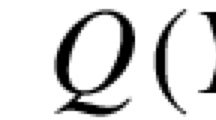Abstract
We model repeated play of noncooperative stage games in terms of approximate gradient steps. That simple format requires little information and no optimization. Moreover, it allows players to evaluate marginal cost or profit inexactly and to move with different velocities. Uncertainty can also be accommodated. Granted some crucial stability, we show that play converges to Nash equilibrium.
Similar content being viewed by others
References
Ya.I. Alber, A.I. Iusem, and M.V. Solodov, “On the projected subgradient method for nonsmooth convex optimization in a Hilbert space,” Manuscript, 1996.
J.-P. Aubin, Viability Theory, Birkhaüser: Basel, 1991.
A. Benveniste, M. Métivier, and P. Priouret, Adaptive Algorithms and Stochastic Approximations, Springer-Verlag: Berlin, 1990.
J.F. Bonnans and A. Ioffe, “Second-order sufficiency and quadratic growth for nonisolated minima,” Mathemartics of Operations Research, vol. 20, pp. 801–807, 1995.
J. Conlisk, “Why bounded rationality,” Journal of Economic Literature, vol. 34, pp. 669–700, 1996.
V.P. Crawford, “Theory and experiment in the analysis of strategic interaction,” in Advances in Economics and Econometrics: Theory and Applications I, D.M. Kreps and K.F. Wallis (Eds.), Cambridge University Press, 1977, pp. 206–242.
P. Dupuis and A. Nagurney, “Dynamical systems and variational inequalities,” Annals of Operations Research, vol. 44, pp. 9–42, 1993.
Yu.M. Ermoliev and S.P. Uryasiev, “Nash equilibrium in n-person games,” (in Russian) Kibernetika, vol. 3, pp. 85–88, 1982.
S.D. Flåm and C. Horvath, “Network games: Adaptations to Cournot-Nash equilibrium,” Annals of Operations Research, vol. 64, pp. 179–195, 1996.
S.D. Flåm, “Approaches to economic equilibrium,” Journal of Economic Dynamics and Control, vol. 20, pp. 1505–1522, 1996.
S.D. Flåm, “Learning competitive market equilibrium,” Economic Theory, vol. 6. pp. 511–518, 1995.
S.D. Flåm and A. Ruszczyński, “Noncooperative convex games: Computing equilibrium by partial regularization,” Working Paper 94–42 IIASA, 1994.
J.-B. Hiriart-Urruty and C. Lemaréchal, Convex Analysis and Minimization Algorithms II, Springer-Verlag, 1993.
L.J. Mirman, L. Samuelson, and L.E. Schlee, “Strategic information manipulation in duopolies,” Journal of Economic Theory, vol. 62, pp. 362–384, 1994.
M.J. Osborne and A. Rubinstein, A Course in Game Theory, The MIT Press: Cambridge, 1994.
J. Robinson, “An iterative method for solving a game,” Ann. Math., vol. 54, pp. 296–301, 1951.
H. Robbins and D. Siegmund, “A convergence theorem for non-negative almost surmartingales,” in Optimizing Methods in Statistics, J. Rustagi (Ed.), Academic Press: New York, 1971, pp. 235–257.
R.T. Rockafellar, Convex Analysis, Princeton University Press, 1970.
J.B. Rosen, Existence and uniqueness of equilibrium points for concave n-person games, Econometrica, vol. 33, pp. 520–534, 1965.
J. Tirole, Theory of Industrial Organization, The MIT Press: Cambridge, Massachusetts, 1993.
J.W. Weibull, Evolutionary Game Theory, The MIT Press: Cambridge, Massachusetts, 1996.
Author information
Authors and Affiliations
Rights and permissions
About this article
Cite this article
Flåm, S.D. Learning Equilibrium Play: A Myopic Approach. Computational Optimization and Applications 14, 87–102 (1999). https://doi.org/10.1023/A:1008709129421
Issue Date:
DOI: https://doi.org/10.1023/A:1008709129421




